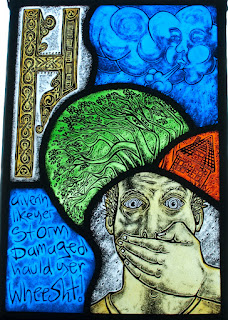Alex Tobin has written an article about the recent exhibition I took part in 'The Making of It'. It outlines the exhibitors and his thoughts about the exhibition.. enjoy!
The Making of
“The Making Of It”
Alex Tobin
It’s raining
heavily when Augustus Veinoglou lets me into the Old Ambulance Depot.
Outside the Depot, an increasing layer of water floats the building
like an artificial island. Indoors, curators Veinoglou, Scott
McCracken and Allan J Robertson have coordinated a series of
highly consonant installations into a sort of pan-European
archipelago. It seems feasible that The
Making of It
might have floated here.
Two hours before opening, the
exhibition is more-or-less ready to go. Everyone is busily squatting
around something: Deniz Guvensoy and Irfan Donmez around the bundles
of red Turkish flag balloons they are preparing; Veinoglou, McCracken
and Clare Flatley around laptops, talking with Swiss artists Dominik
Lipp and Bruno Schlatter over Skype. Lipp, currently shirtless, is
gesturing excitedly to a massive felt-tip pen wall-chart behind him
in Switzerland. He and Schlatter will be conducting a game of
something-like-chess with the crowd here in Edinburgh. As a test run,
I roll some dice and show them to the MacBook camera he’s viewing
the exhibition through, for which he thanks me profusely.
This casual ease
of international communication is a recurrent theme in the
exhibition. The assembled works, based on notions of process,
represent a fictional European utopia where national boundaries are
fluid and pass through each other. For all the disparate cultures
present, the works are surprisingly congruous, and communicate
fluently. As you walk around the space, fragments of sculptures and
paintings disassociate themselves from each other: budding off into
independent organisms, or serendipitously coinciding with their
neighbours. The whole exhibition is vividly fractal in nature –
humorous,
colourful, resembling itself at each level.
Talking to
Veinoglou and McCracken, this visual affinity sounds more fortuitous
than planned. The show has grown naturally from acquaintance and good
networking. Each work was developed in the space in accordance with
the central stimulus, “Process”. This organic development works
in the exhibition’s favour, producing a great amount of visual
rhyme and thematic consistency.
Eilidh
McPherson’s colourful painting Do
the fish even know it’s raining?,
for example, sits next to McCracken’s The
Uncertainty
like a close sibling. Flatley’s Process
and Veinoglou’s Newcomer
neatly benefit from their closeness to each other, each amplifying
the other’s structural motifs.
Martin Campbell’s
Interactive
Workshop
dominates the entrance to the exhibition. It’s intriguingly joyful
and technical in equal measure – a functional wax-making
workspace cast as installation. Later in the exhibition, Campbell
will hold an actual workshop here. Joseph Calleja’s 1.2.4.8.16.
– a row of glass panels held under its own weight by a clamp – is
tense, eerie and fragile, and seems to defy physics. Roz McKenzie
does something very different with glass: her Greed
and Puff
Piece
are political and quite hilarious.
While The
Making Of It posits
an alternate version of Europe, Donmez’s Alternate
Body
reconfigures human anatomy in a similar fashion, to particularly
squeamish effect. It may be enlightening to imagine the countries of
Europe changing places with each other – the same thought
experiment with organs is unsettling. Andrew Smith’s series of
textured paintings are similarly disquieting – somewhat dark in
tone, depicting corrosion of buildings and people.
Niko Mantzios’
The
End of the Protagonists
and Robertson’s Hinterland
share a clean graphic style and urban subject matter. Where
Hinterland
is stark and bright, Protagonists
is warm and quirky. Guvensoy’s Bosphorus
considers the titular Strait at the edge of Europe. Pyramidal stacks
of Turkish flag balloons surmount a series of map-based meditations
on boundaries and coastlines. Taking up the wall at the end of the
Ambulance Depot, Bosphorus
is an appropriate demarcation of the exhibition’s border, marking
the edge of this crypto-European archipelago. Outside the Old
Ambulance Depot, a Bosphorus made of rainwater cuts us off from
continental Edinburgh.
Union (or
ununion)
is currently a prominent element of public discourse. The Eurozone is
newly introspective; Scotland is considering what being a “nation”
should mean. The
Making Of It
proposes a method of union at the human, sociocultural level. It
emphasises
the value of cultural networks and fortuitous international
acquaintance – celebrating altruistic interaction beyond the
constraints of national boundaries.
.jpg)

-5.jpg)
-6.jpg)
-7.jpg)
-8.jpg)
-9.jpg)
.jpg)
.jpg)
.jpg)
-2.jpg)
-3.jpg)
-4.jpg)







.jpg)


.jpg)
.jpg)
.jpg)
.jpg)
.jpg)
.jpg)
.jpg)


.jpg)
.jpg)
.jpg)
.jpg)
.jpg)
.jpg)
.jpg)
.jpg)




